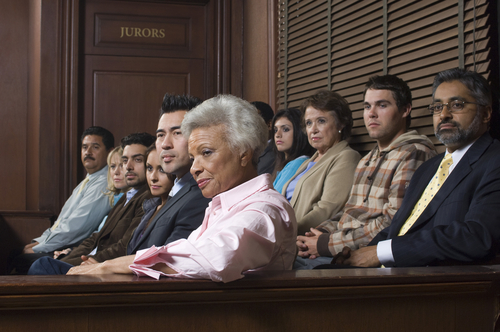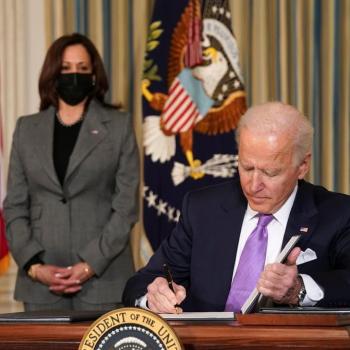Last night, the entire 11th Circuit Court of Appeals voted 7-4 to overturn the conviction of a former Democratic lawmaker — who, by all accounts, was guilty of her crimes — all because the judges felt it was unfair that a juror was dismissed for insisting God told him the lawmaker was not guilty before jury deliberations ever began.
Some background here is helpful because this case is just ridiculous.
If there’s a trial by jury, the hope — what the entire trial hinges upon — is that the jurors will fairly evaluate the arguments presented by both sides and come to their decision based solely on reason and logic and evidence.
In 2017, former U.S. Rep. Corrine Brown (D-FL) was on trial for allegedly filing false tax returns and committing mail and wire fraud. Serious stuff. Both sides presented their cases, and the jurors began to deliberate. If Brown was found guilty, it would have meant several years in jail.
There was just one problem.
Early in their discussions, one of the jurors (known as “Juror #13,” even though there were only 12 of them in the room) told his peers, “A Higher Being told me Corrine Brown was Not Guilty on all charges.” He added that he “trusted the Holy Ghost.”

That wasn’t a statement based on evidence. That was right out of the box before deliberations began. And no matter what anyone thought about Brown’s guilt, that wasn’t the sort of statement you’d ever want a juror to make because it suggested no amount of evidence in the other direction would ever sway him.
The reason we know what Juror #13 said is because Juror #8 sent a letter to the judge explaining what happened, pointing out that “other members of the Jury share my concern.”
What followed was an absolutely fascinating exchange between the Judge and the attorneys for both sides. Really, you should read the full transcript of how they handled the situation because it’ll make you feel really good about our legal system — that the people with power wanted to get this right.
In that transcript, you could see how U.S. District Judge Timothy Corrigan tried to figure out what to do with Juror #13. He solicited input from James W. Smith III (Brown’s attorney) and Assistant U.S. Attorney A. Tysen Duva (acting on behalf of the state).
Smith’s argument, as you’d expect, was that it wasn’t weird for a juror to weigh the evidence and let God point him in the right direction. It’s the same way Christians might weigh a new job opportunity, making a decision based on things like salary and location… and then saying “God pulled me in this direction.” That’s perfectly normal behavior for religious people, he implied. Hell, jurors everywhere may pray for guidance even while they weigh the evidence in front of them.
Duva’s argument, on the other hand, was the one I suspect most atheists would make. The issue wasn’t that the Juror was getting guidance from above, but that no alternative evidence would be given equal weight. Sure, he was concerned that Juror #13 was leaning in his opponent’s direction, but as he suggested multiple times, he wasn’t just shilling for his side:
… the government would have that view [that Juror #13 should be dismissed] if he said, “I believe from my Father in Heaven that she’s guilty of all charges and, therefore, I’m going to vote guilty.” It goes both ways… in no way should this be part of the process.
Both jurors (#13 and #8) were brought in for further questioning and none of the concerns were alleviated, so Judge Corrigan eventually decided to dismiss Juror #13:
… based upon my reading of the case law in other cases where religious beliefs have caused a juror to be struck, this statement by the juror, which he forthrightly admitted to, and which was accurately, apparently, recounted by Juror No. 8, who brought this to our attention, is a disqualifying statement.
…
I want to be very clear that I am drawing a distinction between someone who’s on a jury who is religious and who is praying for guidance or seeking inspiration, or whatever mode that person uses to try to come to a proper decision, from this situation, where the juror is actually saying that an outside force, that is, a higher being, a Holy Spirit, told him that Ms. Brown was not guilty on those charges. And I think that’s just an expression that’s a bridge too far, consistent with jury service as we know it.
It was absolutely the right move, and the Judge went out of his way to make clear this was not religious discrimination. The only concern was that Juror #13 was not following the Court’s direction to rely only on the evidence before him in order to make a decision.
Juror #13 was dismissed. An alternate juror took his place. And deliberations began once again.
11 hours later, the (new) jury found Brown guilty on all counts except four. It meant roughly 60 months in prison on top of “forfeiture and restitution” worth about $664,292.39.
After all that went down, Smith (Brown’s lawyer) appealed the entire ruling, saying dismissing Juror #13 was unfair. The court denied the motion — as it should have since there was no reason to think Juror #13 would even consider evidence that went against what he believed God was already telling him.
More than a year ago, the 11th Circuit Court of Appeals thankfully affirmed that decision. They said the lower court acted correctly (or legally, anyway) in dismissing Juror #13. Justice was served. There was nothing unfair happening.
If, in fact, a juror was not actually deliberating and considering the evidence presented at trial to form his verdict but was rather basing his verdict on what he believed a “Higher Being” or the “Holy Ghost” had “told” him, that would present a serious problem, since it would violate the parties’ “right to receive a verdict rendered by a jury that follows the law”… Because the district court reasonably concluded that these very circumstances could exist in Brown’s case, the district court did not abuse its discretion in making further inquiry.
In a concurrence, a fellow justice added:
Whenever a district court determines that any factor extrinsic to the trial — whether a juror’s stubborn unwillingness to follow the law or evasive answers about that obligation — has so strongly influenced a juror that there is “no substantial possibility” he will base his decision on the evidence in the case, the decision to dismiss the juror is not an abuse of discretion.
…
I concur that the district court’s determination that Juror 13 was not complying with the court’s explicit instructions to decide the case solely on the law and the evidence in the case was not an abuse of discretion on the record before us.
There was one dissenting judge — William Pryor, a George W. Bush appointee — who said it was completely irrelevant that Juror #13 had decided the case based on God’s Word and without examining the evidence. He noted that plenty of people speak to God:
… the majority’s decision makes it far more difficult for the citizens of our Circuit to be judged by juries that represent a cross-section of their communities…
That’s a lie, of course. As the majority and lower court made clear, there’s no legal issue when a juror says he or she is guided by God. Indeed, for all we know, all of those other jurors were also religious and “speak to God” in their own way. The difference here was that Juror #13 made clear that no amount of evidence would even be considered when making his decision.
There’s no semblance of justice to be found in a legal system where “God said so” is reason enough to either convict someone or set her free. By that logic, we may as well drown suspected witches. Why even bother with a legal system in that case?
Pryor may want to live in a theocracy, but at least with that decision, he was outnumbered. Thank goodness.
But Brown’s legal team appealed that decision and we found out a couple of months ago that the entire 11th Circuit would re-consider the case, possibly overturning the three-judge panel’s earlier (and, in my opinion, correct) ruling.
That decision came out last night, and unfortunately, it overturned the earlier conviction. Pryor, writing for the majority, called for a new trial:
Because the record establishes a substantial possibility that the juror was rendering proper jury service, the district judge abused his discretion by dismissing the juror. The removal violated Brown’s right under the Sixth Amendment to a unanimous jury verdict. We vacate Brown’s convictions and sentence and remand for a new trial.
He added, slippery slope-style, that allowing the dismissal to stand could lead to dismissal of all religious people on juries:
Members of some religious groups are more likely than others to report two-way communication with God, underscoring that different people are used to thinking and talking about their prayer life in different ways — and that courts may not conclude that their vernacular alone disqualifies them from jury service.
The dissenting judges said dismissing the juror was a reasonable thing to do and had nothing to do with the juror’s faith:
The decision to remove Juror No. 13 was a tough call, and one the district court did not take lightly. But from the district court’s superior vantage point, it was necessary to ensure that a verdict was rendered based on the law and evidence — a principle that is foundational to our system of justice.
They also pushed back against the slippery slope no-religious-people-on-juries argument:
… In instances like this, a district court’s job is not to make any theological determination about the nature of prayer. The task is simply to determine whether the juror in question is performing his duty as instructed by the court.
…
… As long as jurors have been called to sit in judgment of their fellow citizens, many have relied on prayer to aid them in that task. Many will continue to do so, and no one here has advocated anything different. It is no attack on people of faith for a district court to ensure that jurors make decisions grounded in the law and the evidence, as our Constitution requires.
Alas, all that work to convict Brown — gone. All because a juror decided God’s voice mattered more than all the evidence against Brown combined.
If a juror can decide a case without even considering any evidence, all because God “told him” about a suspect’s guilt, there’s no reason to even have a justice system anymore. The fact that an appellate court now agrees with that faith-based madness shows you how little right-wing religious groups, like the ones who fought for this decision, care about logic and reason.
(Image via Shutterstock. Large portions of this article were published earlier)




It’s Moving Day for the Friendly ..."
It’s Moving Day for the Friendly ..."
It’s Moving Day for the Friendly ..."
It’s Moving Day for the Friendly ..."